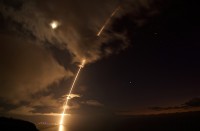SYDNEY, Australia (Reuters) — Australia and New Zealand on Friday (February 19) urged China to refrain from further stoking tensions in the South China Sea after its apparent deployment of surface-to-air missiles on a disputed island.
Tensions were escalated after China deployed an advanced surface-to-air missile system to one of the disputed islands it controls in the South China Sea, Taiwan and U.S. officials said.
“We know that the prosperity of an Australia and New Zealand depends on peace, it depends on harmony and that is why we urge all claimants in the South China Sea to refrain from any building of islands, any militarization of islands, any land reclamation. It is absolutely critical that we ensure that there is a lowering of tensions, because our prosperity and the prosperity of every single person in our region depends on peace, and any actions, regardless of their motivation, which undermine that, which create tensions, are working against the best interests of everybody in this region, Australians, New Zealanders and all our neighbours,” said Australian Prime Minister Malcolm Turnbull.
Turnbull added that if China is serious about falling into the Thucydides Trap, where a rising power causes fear in an established power that escalates towards war, it must resolve disputes through international law.
“And our proposition, very simply, we take no sides on whose claims, we don’t, Australia and New Zealand have no claims in the South China Sea, we can confidently assure you of that. But the fact is that there is a massive vested interest in reducing tensions and not doing things, any measures that would inflame tensions, and so that is why we’ve said in the communique that we urge restraint on all claimants, not just China but all of them, because we all have a big vested interest,” he added.
New Zealand Prime Minister John Key said it was leveraging its relationship with China as the country’s largest trading partner to urge measures to lower tensions, adding that regional prosperity was dependent on maintaining peace.
“I mean both Australia and New Zealand now have free-trade agreements with China, we’re both part of the Asian Investment Bank, we have regular contact and dialogue, and I don’t think it’s lost on any of the parties that are in a disputed position in the South China Sea, that any blow up of activities there would be very bad for security and economic issues in the region. So we just have to continue, I think, to make the case that the parties have got to look to resolve there amicably and lawfully,” said Key.
China claims most of the South China Sea, through which more than $5 trillion in global trade passes every year. Vietnam, Malaysia, Brunei, the Philippines and Taiwan have rival claims.
On Thursday (February 18), Chinese Foreign Ministry spokesman Hong Lei would neither confirm nor deny if the missiles were on Woody Island, but repeated that China has had defence facilities on the islands for decades.
The warnings by Australia and New Zealand come a couple of days after the United States and the European Union warned China that it should respect an international court ruling expected before May on its dispute with the Philippines over territory in the South China Sea.
China rejects the authority of the Permanent Court of Arbitration in the Hague hearing the dispute, even though Beijing has ratified the U.N. Convention on the Law of the Sea on which the case is based.








